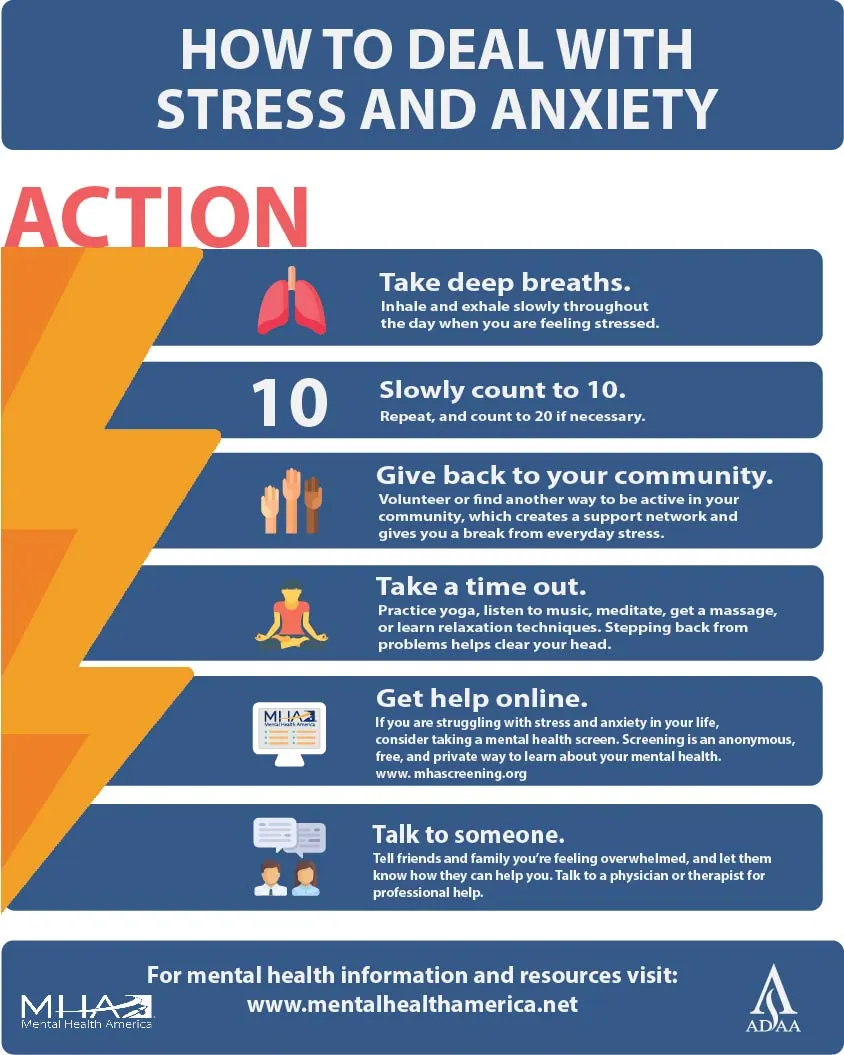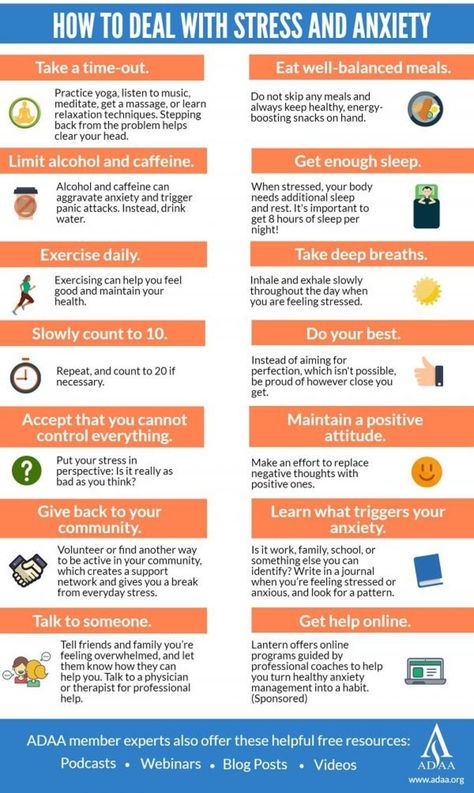How to help someone with stress
Learning How to Support Someone Who Is Stressed
In this Article
- Signs of Stress
- Help Them Recognize The Problem
- Listen to Them
- Identify the Problem
- Get Active
- Fill Their Free Time
It’s hard enough to be stressed yourself, but when someone you know is stressed, it can be difficult to know how to help. Learning to help others deal with mental pressure is a useful skill that could serve you well in many situations. There are many ways to support someone who is stressed.
Signs of Stress
Stress can happen when you go through life changes or face challenges that you’re not prepared for. Your body creates physical and mental responses to help your body adjust to new situations. Although stress isn’t always a bad thing, if you don’t try to relieve it or relax, it can take a toll on you.
Common physical signs of stress include:
- Difficulty sleeping and exhaustion
- Headaches
- Shaking
- Dizziness
- Tense muscles
- Stomach pains
- Digestive issues
Common emotional and mental signs of stress include:
- Anxiety
- Exasperation
- Depressed feelings
- Sadness
- Panic attacks
Help Them Recognize The Problem
Whether you want to help a friend, coworker, family member, or other acquaintance, a great first step is to help them understand that they are stressed. They might find it tough to come to terms with what they are going through. They may be ignoring their feelings.
You can be kind but direct when reaching out to them. You can let them know you’ve noticed changes in their behavior or other signs of stress. If you talk to them with a caring attitude, they may be more open to letting you help them manage stress.
Listen to Them
It could be tempting to give advice right after offering your support. But how will you know what to say if you don’t first listen to how they’re feeling? You might end up just being a listening ear for your stressed-out friend, and that’s OK. Knowing that someone they trust cares and is offering their undivided attention could do wonders.
Another reason that listening is more important than talking is that it takes the pressure off of your friend. As they’re confiding in you, they should know that you’re there to support them, not push them to do something. If they aren’t ready to take action, that’s OK.
Identify the Problem
Talk about what might have caused the stress. Depending on how well you know them, you can give examples of behavior changes or new habits you’ve seen. Avoid accusing them of anything. You can have an open conversation where you each have the chance to express your perspectives.
Get Active
A great way to help your friend get rid of stress is to exercise. Physical activity helps manage stress for many reasons. Exercise:
- Increases endorphins. During exercise, the brain releases endorphins. Endorphins are neurotransmitters that help you feel good. Any activity that gets your heart pumping will release endorphins. You can suggest going on a hike, playing a sport, or taking a bike ride together.
- Battles negative side effects of stress. Physical activity creates similar symptoms in the body that stress does, for example, the fight or flight response. Exercising teaches your body how to positively handle these symptoms. As your body learns that these signs of stress aren’t always negative, it will learn how to protect itself.

- Offers time for meditation. Exercise allows you to let go of what might be bothering you. Your focus is on your body instead of your stressors. This is the body’s natural response when it gets moving. This can allow your friend to shed tension and calm down.
Fill Their Free Time
You can encourage your friend to do one of two things: spend time alone or spend time with others. This depends on their personality and interests, but it’s worth suggesting both as good options to manage stress.
Taking some “me time” can be relaxing. This can allow your friend to do some calm thinking about their situation and how they can make it better. If there’s a hobby they enjoy, they can take a break from the stress and throw themselves into it.
Suggest a fun activity that will engage their mind and distract them from the stress. Connecting with others could give them laughter, distractions, and a new perspective.
Remain positive as you try to support someone who is stressed. The best thing you can do is be present and supportive.
The best thing you can do is be present and supportive.
5 Ways to Help Someone Who Is Stressed
When someone you care about is stressed, there are practical ways you can help in a supportive manner.
Everyone experiences stress from time to time. When someone close to you is feeling overwhelmed, it can be easy to put yourself in their shoes. You may know how hard it is to hear people tell you to “just relax” or “calm down” when you’re feeling stressed.
But when someone you know is stressed, it can still be hard to know how to help. It can be even harder when a friend is showing signs of chronic stress or even depression.
Learning ways to offer support and knowing what to say and what not to say can be helpful for someone going through a stressful time.
They are not alone and neither are you. It is possible to support someone who is stressed during their time of need.
There are many ways to support a loved one who is dealing with stress. Here are a few ideas experts suggest considering.
One of the best things you can do for someone who is stressed is to listen, says Dr. Roberta Ballard, a clinical psychologist residing in Marietta, Georgia.
It may be tempting to suggest a solution for their stress, but instead of trying to fix their problem, simply try to let them know you’re listening and understanding what they are saying, says Ballard.
“They might only need someone to listen, and your work is done! But if they ask for advice, you are in a better position to offer helpful insights if you have listened and have a solid understanding of what’s going on.”
One way to help a friend release some of their stress is to get active. Emilea Richardson, a licensed marriage and family therapist residing in Greenville, South Carolina, suggests exercising.
“It can be as gentle as a 10-minute yoga video or a walk to the mailbox. It could be as intense as a HIIT session or lifting serious weights,” says Richardson.
As long as you get your body moving and heart pumping, you’ll release endorphins and reduce the cortisol in your body, explains Richardson.
If you want to try this, get started by engaging in any kind of activity the person you’re trying to help enjoys. This can include dancing, roller skating, or just going for a walk.
Richardson says laughter can help relieve stress. However, she says, “not just a half-laugh though, you need a big belly laugh.” To try this, you can take your friend to see a comedy show or watch a funny TV show or film together.
Crying can be another way to relieve stress, since it may release cortisol from the body, says Richardson. However, more research is still needed on this topic.
To try this approach, you can switch the movie or show to a tearjerker or just offer yourself to your friend as a shoulder to cry on.
Additional ideas for helping someone who is stressed include:
- providing random acts of kindness, like buying them flowers or food
- offering to help in any way you can.
- validating their feelings.
- distracting them with something enjoyable, like a movie, walk, or game.

- suggesting deep breathing exercises.
Finding the right words in a stressful situation is not always easy. If you’re trying to find the words to help out a loved one in a stressful situation, consider something that validates their feelings and will not make them feel guilty for being stressed.
“You don’t have to say much, just let them know that you’re tuned in and listening,” says Richardson.
Consider saying things like:
- “Let me know how I can be of support.”
- “How can I help you focus on one thing at a time?”
- “This must be really hard for you.”
Try to avoid saying things like:
- “That doesn’t sound hard.”
- “You’ll be fine.”
- “You just need a vacation.”
Another thing professionals advise against is the classic response of “just relax.”
“When you say ‘relax’ to a stressed person, they feel invalidated and misunderstood,” says Richardson. This can cause the person more tension or stress.
Stress can range from short-term to long lasting (chronic stress) and can affect your mental and physical health.
“Feeling stuck in a state of overwhelm can lead to feelings of despair, which can veer into depression,” says Liza Gold, a licensed clinical social worker in New York City.
If a loved one is feeling stressed, look out for the following changes in their behavior, says Gold:
- seeming tense, irritable, or on edge
- experiencing changes in sleeping habits
- experiencing changes in appetite
- misusing drug or alcohol
- exercising compulsively
“If you notice that a loved one is stressed, don’t be afraid to say something. Let them know you can sense that they’re feeling overwhelmed, and ask how you can be of support,” says Gold.
If you notice any of these symptoms in your loved one, you can read more about how to support someone with depression.
If you know someone who is dealing with stress, there are ways you can support them.
Finding the right words and knowing the signs of chronic stress can help your loved one navigate their way through a stressful situation.
Try to remain understanding and avoid judgment. You can also try helping them release stress through laughter, tears, or exercise.
If your friend is struggling to cope or their symptoms of stress will not go away, it may be time for them to consider talking with a therapist.
Try to remain positive and support your friend as best as you can.
How to help a loved one survive stress?
How to help a loved one cope with stress?
Stress is a state of emotional and physical tension that occurs as a reaction to any event (positive or negative) that is difficult or impossible for a person to cope with. In the view of many, stress is an enemy that it is desirable to get rid of forever. It is wrong to consider stress only in a negative way, because short-term stressful situations help a person to activate his strength, strengthen his nervous system, and find new ways to solve difficulties. But it should be understood that in the presence of constant anxiety, the human body spends too many resources and is quickly depleted. Chronic and acute stressful situations negatively affect not only psychological mechanisms, but also the whole organism as a whole, leading to a number of problems.
But it should be understood that in the presence of constant anxiety, the human body spends too many resources and is quickly depleted. Chronic and acute stressful situations negatively affect not only psychological mechanisms, but also the whole organism as a whole, leading to a number of problems.
The causes of stress are diverse and individual, because each person reacts to the same events in his own way. A stressful state can be caused by the loss of loved ones (death, divorce), job loss, catastrophe, sudden social, political or economic changes, serious illness, violence - any event for which a person was not ready and which undermines the foundations of his usual life.
Sometimes a person himself does not understand what is happening to him, cannot adequately assess his condition. And then relatives should come to his aid. First of all, you should pay attention to any drastic changes in the behavior and emotional state of a person: depression, lethargy, fatigue, unwillingness to communicate and do the usual things, or vice versa, excessive aggressiveness, irritability and dissatisfaction with what is happening. Complaints of sleep and appetite disorders, headaches, tremors, excessive sweating, problems with memory and concentration, and decreased productivity can give out a stressful state. A person who has experienced a traumatic event may be haunted by recurring unwanted memories and dreams about it, the fear of a repetition of the situation. Signs of a stressful state can also be attacks of fear and panic, inability to relax or be distracted, constant tension, frequent desire to cry, distrust of oneself and others around.
Complaints of sleep and appetite disorders, headaches, tremors, excessive sweating, problems with memory and concentration, and decreased productivity can give out a stressful state. A person who has experienced a traumatic event may be haunted by recurring unwanted memories and dreams about it, the fear of a repetition of the situation. Signs of a stressful state can also be attacks of fear and panic, inability to relax or be distracted, constant tension, frequent desire to cry, distrust of oneself and others around.
Often help a person survive stress, even a non-professional. What can loved ones do? The first task is just to be there. No need to obsessively offer your help or advise to speak out. It is important to make it clear that a person is not alone, and next to him there will always be relatives, ready to listen and support. It is necessary to encourage the expression of feelings and emotions, avoid platitudes and show that any experiences and reactions of a person to stress are normal. In some cases, relatives can help reduce exposure to stress (for example, by limiting information about the traumatic event). If necessary, close people can temporarily remove part of the load from a person (for example, help with household chores) in order to free up time for relaxation, analysis of the situation and recovery. Sometimes it's helpful to share your own thoughts and feelings about what's going on, but don't pull the blanket over yourself, downplay the problem, or try to teach you how to behave. The main allies in helping are closeness, openness and support. And of course, do not forget that before helping others, it is important to assess your own condition, to make sure that there are enough resources and strength for this.
In some cases, relatives can help reduce exposure to stress (for example, by limiting information about the traumatic event). If necessary, close people can temporarily remove part of the load from a person (for example, help with household chores) in order to free up time for relaxation, analysis of the situation and recovery. Sometimes it's helpful to share your own thoughts and feelings about what's going on, but don't pull the blanket over yourself, downplay the problem, or try to teach you how to behave. The main allies in helping are closeness, openness and support. And of course, do not forget that before helping others, it is important to assess your own condition, to make sure that there are enough resources and strength for this.
You need to understand that if a person after stress cannot cope with what is happening for a long time or is acutely worried about what happened, it is necessary to provide him with professional help. In no case should you force him, you need to openly talk about it and motivate him to contact a psychologist. Relatives themselves can also turn to a psychologist in order to assess the degree of danger of a stressful state, to choose the right behavior strategy.
Relatives themselves can also turn to a psychologist in order to assess the degree of danger of a stressful state, to choose the right behavior strategy.
"Shut up, sadness": how to help cope with stress
"Shut up, sadness": how to help cope with stress | Big Ideas Emotional intelligenceArticle published in Harvard Business Review Russia Holly Wicks
Recently I got a fair amount of stress and couldn't sleep. I had to tell a rather unpleasant colleague, besides a senior rank, what he did not want to hear from me at all, and I was always afraid of his loud and angry remarks. My friend listened to my complaints, nodded slightly and replied: “Well, yes, I am often yelled at for less.” His words and calm manner helped me change my point of view on the upcoming conversation, returned a sense of normalcy. This conversation no longer seemed like the end of the world to me (that's what it seems to be in a state of stress). I remembered that unpleasant things happen to all of us, and yes, they are unpleasant, but life does not end there.
I remembered that unpleasant things happen to all of us, and yes, they are unpleasant, but life does not end there.
I don't know a single person who would benefit from "don't worry" advice. It is much better to show the interlocutor that this difficult situation for him can be approached from a different point of view. Some types of help may be easier and more effective than others, so if you decide to support a person, first remember that you do not need to say .
Avoid cliches and platitudes. Cliches and platitudes do not inspire a stressed person, but exacerbate his condition, because they have no content. Stress is not the same as laziness or lack of motivation, so don't say, "When you're having a hard time, grit your teeth and work" or "Come on, do it!".
Do not pull the blanket over. If you have undertaken to help, try not to reduce the whole conversation to your loved one, do not turn the interlocutor and his problems into something insignificant. The story of how you failed at the conference will have to wait until another time. And never say: “Are you doing something bad? Here I am…”
The story of how you failed at the conference will have to wait until another time. And never say: “Are you doing something bad? Here I am…”
Don't downplay the problem. We dismiss other people's problems because we feel uncomfortable. By this we do not help at all, and we ourselves look insignificant. “Don't worry”, “It's nothing”, “You're exaggerating”, “It doesn't matter - it will pass” - all these phrases do not need to be said.
Do not read morality. If you talk down, then again, you will not help in any way, moreover, you will only make the interlocutor even more irritable. Suppress the desire to be boring in the spirit of “But if you managed your time correctly…”
No need for lengthy condolences. Briefly expressing regret will help your colleague talk. But empathy alone doesn't help. If you sit down next to him and begin to mourn his ill-fated fate, things will never get off the ground.
Stress affects us mentally, physically, psychologically and emotionally.














